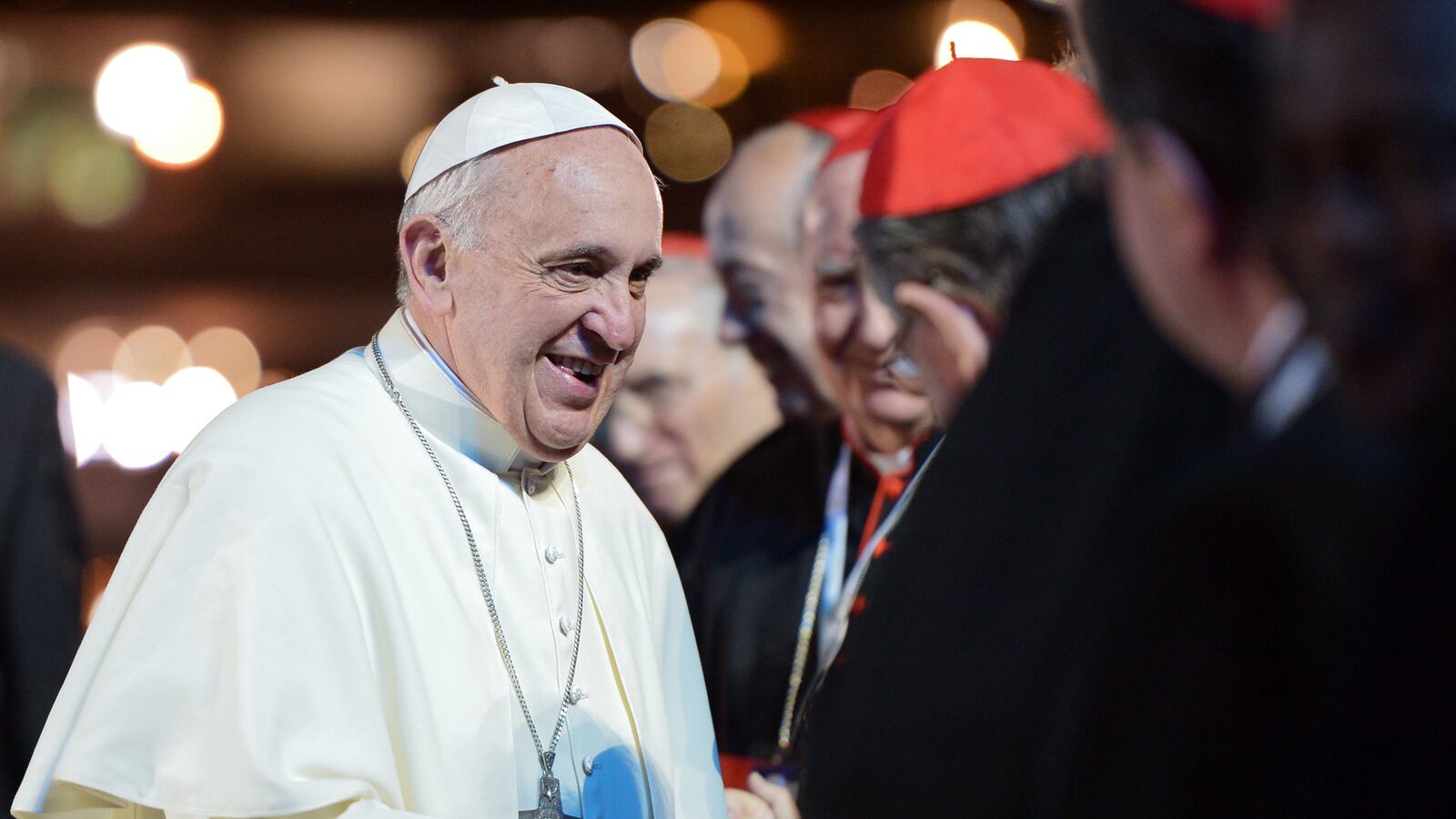Just when you thought Pope Francis didn’t have any more surprises up his sleeve, there he goes again. On the papal flight back to Rome after a raucous reception for World Youth Day in Rio de Janeiro on Monday, Francis gave an 80-minute Q&A session to journalists in which he seemed to soften the church’s stance on homosexuality in the priesthood. While stopping short of endorsing gay marriage, he did say something a pope has never said before. “If someone is gay and he searches for the Lord and has good will, who am I to judge?” he asked. By any previous standard of measure, judging is exactly what a pope is supposed to do. Apparently not so with Pope Francis—at least for now.

It seems all the hype about the evils of homosexuality was lost during the transition between now-retired Pope Benedict XVI and his predecessor. Certainly the message has been rewritten. In 2005, Benedict signed a far-reaching document banning men with “deep-rooted homosexual tendencies” from the priesthood. Francis has not exactly reversed the church’s stance, but the fact that he does not support automatically banning gays from the priestly vocation is a major step—or at least a great headline. In fact, everything Francis says and does is making news. Just four months into his pontificate, he is being touted as revolutionary and radical, shunning the lavish papal vices and rewriting the rules on how popes rule.
But those who know the church best caution that the pope’s rock-star popularity is vaguely familiar, and that four months is not long enough to make a legacy. “It reminds me of John Paul II in 1978,” says Vatican expert and National Catholic Reporter correspondent John Allen, who was in the press area of the papal plane when Francis came back to chat. “He was also a pope who changed the way the papacy had been run; he was on the cover of magazines; he was a revolutionary, too. But it didn’t take long to see that it was just a change in the style of delivering the message, not changing the message at all.”
Allen cautions that remarks like the one Pope Francis just made do not mean a change in the church’s position on homosexuality per se. “This is all about tone, not teaching,” warns Allen. “Treating homosexual people with respect and love has been part of the church’s catechism teaching; it was never the homosexuality itself but the conduct of gay priests. This pope’s popularity is in the message, but so far he has not made any changes to doctrine or discipline.”
Francis made the unscripted gay comment in reference to a question about the existence of a powerful gay lobby inside the Roman Curia. He said the problem with the gay lobby was not so much the “gay” part, but the fact that any lobby exists inside the Holy See. The topic reached a boiling point recently when it became clear that one of the pope’s recent appointments to be his eyes and ears inside the troubled Vatican Bank as it muddles through tough reforms had a secret double life when he worked for the papal embassy in Uruguay. Days after the papal appointment, an Italian magazine broke a story that Cardinal Battista Ricca had kept a male lover on Vatican grounds and had been found in a compromising situation after being trapped in an elevator with a male prostitute. The pope told journalists that he had ordered an initial investigation into the alleged bad behavior even though the magazine stands by its well-sourced story. “We found nothing,” he told the journalists, implying, at least for a time, that the monsignor would stay in place, causing more than a few raised eyebrows about maintaining the status quo of turning a blind eye to business as usual and, perhaps more worrisome, succumbing to the pressure of the same gay lobby he is trying to root out.
He was also less than ground-breaking on the issue of the role of women in the Catholic Church, admitting that John Paul II had ruled on the ordination of women, but that he felt that there was room for a greater role for women in the church, both in the way the church looks at women in society, which he referred to as the “theology of women” and how they might be able to serve the church through roles of greater responsibility. “We cannot limit the role of women in the church to altar girls or the president of a charity, there must be more,” he said. “But with regards to the ordination of women, the church has spoken and says ‘no.’” Not exactly revolutionary, to say the least, but at least people were listening to the message.





